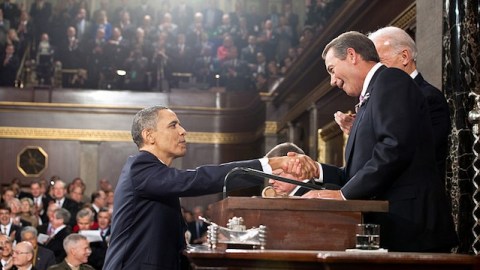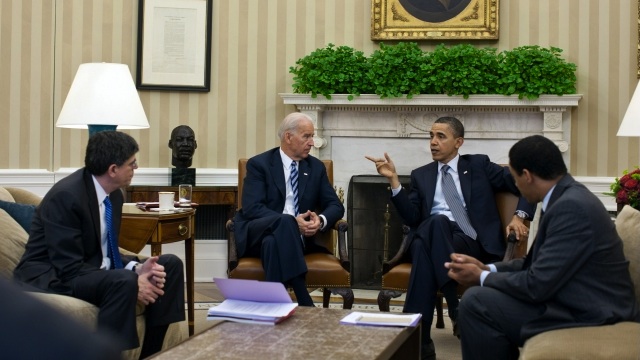Is America Broke?

“We’re broke,” Speaker of the House John Boehner (R-OH) said in a recent speech. “Broke, going on bankrupt.” Federal and state governments certainly face serious fiscal problems, and can’t continue to spend more than they take in indefinitely. But are they really broke?
If by “broke” you mean “can’t afford to spend any more,” then, as E.J. Dionne says, the answer is no. The federal debt is a nominal record high $14.2 trillion. That’s a large percentage of the U.S. G.D.P.—approaching 100%—but not historically high one. In fact, as this chart shows, the debt-to-G.D.P. ratio reached more than 120% after the end of WWII—fiscal conservatives should note that the federal deficit more than doubledunder President Reagan. While WWII was obviously required us to dig especially deep, it’s worth noting that we could dig deeper if extraordinary circumstances demanded it.
There’s certainly little evidence that the U.S. is close to default. Dionne quotes Bloomberg’s David J. Lynch, who points out that Standard & Poor’s still gives U.S. debt a AAA rating. As Lynch says,
The U.S. today is able to borrow at historically low interest rates, paying 0.68 on a two-year note that it had to offer at 5.1 percent before the financial crisis began in 2007. Financial products that pay off if Uncle Sam defaults aren’t attracting unusual investor demand. And tax revenue as a percentage of the economy is at a 60-year low, meaning that if the government needs to raise cash and can summon the political will, it could do so.
Lynch’s last point is the key to understanding our fiscal problems. It’s not that we can’t afford to fund the government, but that we have made a political choice not to do so. As Lynch explains, federal tax revenue is at its lowest level as a percentage of the economy since 1950. In 2009, taxes of all kinds accounted for just 24% of the U.S. G.D.P., compared with 34% for the U.K., 37% for Germany, and 48% for Denmark. If federal tax revenue simply went back up to its 40-year average as a percentage of G.D.P., roughly a third of our annual budget deficit would go away.
Yet instead of raising taxes, we continue to lower them. That’s what makes Boehner’s claim so dishonest. In December he voted for the bipartisan deal to extend the Bush tax cuts and add new tax breaks. So the Boehner doesn’t believe the deficit is more important than refunding money to taxpayers. He just believes it’s more important than many of programs the government is currently funding. As Dionne says, the same is can be said of Wisconsin Governor Scott Walker, who has used the claim that his state is bankrupt to justify slashing the salaries of public employees—after approving new tax cuts. This is no different the same as a company issuing new dividends to shareholders and then telling employees that it can’t continue to pay them. The truth is not that Wisconsin can’t afford to pay public employees, but that Walker simply thinks they’re getting too much.
Whatever the merits of Boehner and Walker’s idea that we should cut spending and continue to lower taxes, the claim that we’re broke is pure propaganda. And while we may not be in the middle of WWII, with 9% of the population out of work more than two years after the financial crisis, these are extraordinary circumstances. The fact is that many Americans really are broke—and maybe it would be worth it to spend some money to help them get back on their feet.
Photo credit: Pete Souza




